DOWNLOAD NEWS 2016/4
By Brian Wilson
DL News 2016/3 is here
and the Index of earlier editions is here.
I apologise for the inclusion of several longer than usual reviews.
Mostly they were originally intended for the main MusicWeb pages but
somehow never got completed and I’ve only now caught up with them,
too late to go where they were intended.
Index 2016/4:
ARNE Symphonies – Chandos
— Concertos – Hyperion
— Dr Arne at Vauxhall – Hyperion
BACH Concerto for two violins (+ VIVALDI) – Alto
BALAKIREV Russia: see RACHMANINOV
BERTALI La Maddalena – Ricercar
— Missa Resurrectionis – Rezound
BRUCH Works for Violin and Orchestra – BIS_Chandos
CARESANA Neapolitan Tenebræ (+ VENEZIANI) –
Glossa
DEBUSSY Chamber Music – Arcana
DVOŘÁK Violin Concerto; Romance (+ SUK) – Ondine
ELGAR Introduction and Allegro; Serenade, etc (+ VAUGHAN WILLIAMS)
– Decca
FERRANDINI Al Santo Sepolcro – Fra Bernardo
FINZI Introit; Eclogue, etc. – Decca
HANDEL Fireworks Music; Concerti a due cori – Arcana
— Handel at Vauxhall Volume 1 – Signum
HOMILIUS Der Messias – CPO
HEBDEN Concertos – Chandos
IBERT Escales, Divertissement, etc – Chandos
LUPUS Cantus coagulatus – Musiques Suisses
MESSIAEN L’Ascension, etc. – Naxos
NOTKER Sacred Music – Christophorus
RACHMANINOV Symphony (+ BALAKIREV Russia) – LSO Live
RUBBRA Symphony No.5 (+ SIBELIUS) – Beulah
SANCES Stabat Mater, etc. – Mirare
SCHUBERT Die schöne Müllerin – DG, Warner,
etc.
SELLE Easter Music – CPO
SHOSTAKOVICH Violin Concertos_Chandos
SIBELIUS Edition – Volume 8: Orchestral Works – BIS
— Pelléas et Mélisande etc. –
Naxos
— Symphony No.5 – Beulah
SUK Fantasy (see DVOŘÁK)
VAUGHAN WILLIAMS The Lark Ascending; Tallis Fantasia (+ ELGAR)
– Decca
VENEZIANI see CARESANA
VIVALDI Violin Concertos (+ BACH) – Alto
WORTHINGTON Dream Vapors – Navona
BAX, BLISS, DYSON, VEALE: British Violin Concertos – Chandos
Hæc Dies: Music for Easter – Harmonia Mundi
Poème – The Artistry of Lydia Mordkovich –
Chandos
RIMSKY-KORSAKOV, RACHMANINOV, GLAZUNOV: Russian Masters Volume
8 – Beulah
***
Manfred Barbarini LUPUS (fl.c.1560)
Cantus coagulatus – four-part compositions for Mass and
Office of St Gall (c.1562-64)
In festo Sancti Galli – Ad vesperas (for Vespers): Deus
in adiutorium; Hymn: Vita sanctorum; Antiphon and Magnificat
[12:95]
Ad missam (Mass) [42:84]
In festo Sancti Othmari: Fidelis servus [7:31]
In festo Beati Notkeri: Hymn: Rector eterni; Sequentia Sancti
Spiritus (Sequence of the Holy Spirit) [11:07]
Ensemble Ordo Virtutum [Jan Börner (cantus), David Feldman (alto),
David Munderloh (tenor), Sebastián León (bass); Hubert
Mayer, Johannes Mayer, Stefan Morent, Jörg Rieger (choir); Roland
Götz (organ), Irene Götz, Samuel Schick, Stefan Morent (bellows)]/Stefan
Johannes Morent
rec. 2015
MUSIQUES SUISSES MGB CD6286 [77:06] – from eclassical.com
(mp3 and lossless, NO booklet).
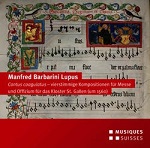 The
download from eclassical.com and the streamed version from Naxos
Music Library come without the booklet, though the latter provides
the back cover of the CD. Between them and the Musiques
Suisses website I’ve been able to patch together the information
above. You can also find a short sample by following the Musiques Suisses
link and there are more samples on Ordo
Virtutum’s website (in German).
The
download from eclassical.com and the streamed version from Naxos
Music Library come without the booklet, though the latter provides
the back cover of the CD. Between them and the Musiques
Suisses website I’ve been able to patch together the information
above. You can also find a short sample by following the Musiques Suisses
link and there are more samples on Ordo
Virtutum’s website (in German).
If you know and like the music of the Franco-Flemish school of the late
fifteenth and early sixteenth century, such as that of Josquin des Prés
and Orlandus Lassus, you should feel at home with the music which Lupus
was composing in a seemingly old-fashioned style at a rather later date
for the abbey of St Gall or Gallen in Switzerland. As the Musiques Suisses
website puts it, ‘[T]he style of the [music] was not a result of ignorance,
but a conscious decision [made] in the context of the tensions between
the monastery’s own long traditions, the compositional innovations of
the 16th century, and the endeavours of the humanists and the Counter-Reformation
in the context of the Council of Trent’.
The music is preserved in two handsome manuscripts: Cod. Sang. 542 and
543. The selection here, made in association with a concert in the Cathedral
of Sankt Gallen, comes from Vespers of the abbey’s founder, the Irish
hermit St Gall, with extra pieces for the feast of St Othmar (first
abbot of St Gall) and the Blessed Notker – usually identified with
the composer and writer Notker Balbulus (below). The Vespers Magnificat
is sung alternatim, a well-established tradition in which one
verse is sung in chant and the next in a very simple polyphony.
The combination of chant and polyphony in the preceding hymn Vita
sanctorum is also not unusual for the time: Robert White, for example,
did the same with his setting of the evening hymn Christe qui lux
es. (New recording from Jesus College, Cambridge, included in The
Evening Hour, choral music from the sixteenth and twentieth centuries,
Signum SIGCD446).
Less usual but not unprecedented is the fact that some of the clauses
in the Gloria and Credo are not sung but played instrumentally,
with the words ‘imagined’ – as in other ‘organ masses’ –
hence, presumably the title Cantus coagulatus. If you look up
coagulatus in a Latin dictionary you’ll find that the primary
meaning is ‘curdled’ but presumably here it covers the combination of
chant, polyphony and organ verses. The music is well worth 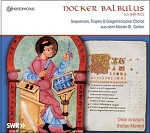 investigating
and it receives splendid performances: scholarly and beautiful, and
very well recorded. Only the lack of documentation is annoying, especially
if your Latin is rusty – eclassical.com just give the incipit
of each piece. Only Amazon
seem to stock the CD in the UK.
investigating
and it receives splendid performances: scholarly and beautiful, and
very well recorded. Only the lack of documentation is annoying, especially
if your Latin is rusty – eclassical.com just give the incipit
of each piece. Only Amazon
seem to stock the CD in the UK.
Several centuries before Lupus a composer by the name of Notker Balbulus
(‘Notker the stammerer’) or Notker of St Gall (c.840-912) composed music
for St Gallen and Ordo Virtutum have also recorded a selection of his
sequences, tropes and chant for the Christophorus label (CHR77431).
Stream
(for subscribers) or download,
with pdf booklet, from classicsonlinehd.com.
Antonio BERTALI (1605-1669)
La Maddalena (Vienna, 1663) prefaced by
Claudio MONTEVERDI, Alessandro GUIVIZZANI, Muzio EFFREM and Salomone
ROSSI Musiche Composte per La Maddalena (Mantova, 1617) and
Antonio BERTALI Sonata 3 à 3
and concluded with Domenico MAZZOCCHI Lagrime amare
Deborah Cachet, Alice Foccroulle (sopranos); Luciana Mancini (mezzo);
Reinoud van Mechelen, Dávid Szigedvári (tenors); Nicolas
Achten (baritone); Sönke Tams Freier (bass);
Scherzi Musicali/Nicolas Achten
rec. Provinciaal Museum Begijnhofkerk Sint-Truiden, 26-28 February 2015.
DDD
Texts and translations included
RICERCAR RIC367 [67:42] – from Qobuz: stream
(subscribers) or download
(16– and 24-bit) all with pdf booklet.
Antonio BERTALI Missa Resurrectionis (ed. Brian Clark):
Easter Sunday in Imperial Vienna, 1666, with music by Johann Jakob
FROBERGER (1616-1667), Christian GEIST (c.1650? 1670?-1711)
and Pavel Josef VEJVANOVSKY (c.1640-1693)
Spiritus Collective; Ilya Poletaev (organ)
Yale Collegium Players/Robert Mealy
Yale Schola Cantorum/Simon Carrington
rec. live St. Mary's Church, New Haven, Connecticut, 4-5 December, 2005,
and St. Michael’s Church, New York City, 6 December, 2005. DDD
World premiere recording
Texts and translations included.
REZOUND RZCD5013 [54:03] – from eclassical.com
(mp3 and lossless, NO booklet). Booklet available from Naxos
Music Library for subscribers.
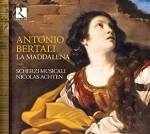
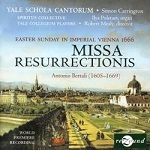
These two recordings of music principally by Bertali make a good pairing:
La Maddalena was composed for performance during Holy Week and
the Mass for Easter Sunday.
Eclassical.com also offer instrumental music by Bertali and Johann Schmelzer
as adjuncts to Giovanni Felice Sances’ setting of Stabat Mater,
an anonymous Salve Regina, Marco Antonio Ziani’s Alma
Redemptoris Mater and Bertali’s entrada for Regina Cœli,
performed by the Ricercar Consort and Philippe Pierlot (Mirare MIR050,
mp3 and lossless, with pdf booklet). At $15.27, that’s slightly more
expensive for UK purchasers than Qobuz’ £8.49, also with booklet
– stream
(for subscribers).
Tenebræ : Neapolitan music for the Holy Week
Cristofaro CARESANA (c.1640-1709)
Lectio III del Giovedi Santo (Third Reading for Maundy Thursday,
1686) [9:35]
Lectio III del Venerdi Santo (Third reading for Good Friday,
1686) [7:26]
Giuseppe Antonio AVITRANO (c.1670-1760)
Sonata VI a3 for violin and continuo ‘La Carafa’ (1713) [10:43]
Gaetano VENEZIANO (1665-1716)
Lectio I del Primo Notturno del Mercoledi Santo (First Reading
of the First Nocturne for Wednesday in Holy Week, 1690s) [13:36]
Sinfonia a7 [3:14]
Lectio III del Primo Notturno (Third Reading of the First Nocturne,
1690s) [19:36]
Valentina Varriale (soprano)
I Turchini [Alessandro Ciccolini, Patrizio Focardi, Paolo Cantamessa
(first violins); Marco Piantoni, Nunzia Sorrentino, Massimo Percivaldi
(second violins); Rosario Di Meglio (viola); Rebecca Ferri (cello);
Giorgio Sanvito (double bass); Patrizia Varone (organ)]/Antonio Florio
rec. Sala del Vasari, Chiesa di S Anna dei Lombardi, Naples, October
2010. DDD.
GLOSSA GCD922602 [64:19] – from eclassical.com
(mp3 and lossless, NO booklet); subscribers stream from Naxos
Music Library (with pdf booklet containing texts and translations)
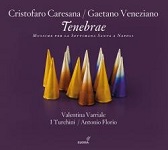 Tenebræ
are – or were – the lessons or readings from the Lamentations of Jeremiah
prescribed in the Roman rite for Matins during the latter part of Holy
Week. The readings are divided into three sections or nocturnes, with
accompanying psalms and canticles. Until the reforms of the 1950s they
were sung in anticipation on the preceding evening in a nearly-darkened
church with a pyramid of candles extinguished one by one until only
one was left signifying Christ the Light in the darkness (Latin tenebræ
= darkness). Thus what is described as for Wednesday was actually Matins
of Maundy Thursday, etc.
Tenebræ
are – or were – the lessons or readings from the Lamentations of Jeremiah
prescribed in the Roman rite for Matins during the latter part of Holy
Week. The readings are divided into three sections or nocturnes, with
accompanying psalms and canticles. Until the reforms of the 1950s they
were sung in anticipation on the preceding evening in a nearly-darkened
church with a pyramid of candles extinguished one by one until only
one was left signifying Christ the Light in the darkness (Latin tenebræ
= darkness). Thus what is described as for Wednesday was actually Matins
of Maundy Thursday, etc.
Settings with female soloists were popular in France and Italy, with
the public flocking to hear them. These are less well known than and
less dramatic than their almost operatic seventeenth-century French
counterparts, but the settings here are all very beautiful. They are
beautifully sung, with excellent instrumental support and crystal clear
recording. The notes in the booklet are scholarly and readable.
The eclassical.com download is marginally less expensive than that from
classicsonlinehd.com but comes without a booklet. The Latin text of
Lamentations is readily available online but subscribers to Naxos Music
Library will find the booklet there and classicsonlinehd.com
also offer the liner notes for streaming (by subscribers) or for purchase
as a download.
Johann Sebastian BACH (1685-1750)
Concerto for two violins in d minor, BWV1043 [16:52]
Antonio VIVALDI (1678-1741)
Concerto for two violins in g minor RV517 [9:12]
Concerto for two violins and strings in D, RV512 [8:57]
Concerto in c minor for two violins RV509 [9:51]
Concerto in d minor for two violins RV514 [10:46]
Concerto in a minor, Op3/8 (Con violino principale con altro per
eco in lontano), RV522 [12:12]
David Oistrakh (violin); Igor Oistrakh (violin)
Royal Philharmonic Orchestra/Eugene Goossens (Bach), David Oistrakh
(Vivaldi Op.3/8)
David Oistrakh (violin); Isaac Stern (violin)
Philadelphia Orchestra/Eugene Ormandy (remaining Vivaldi)
rec. 1961. ADD/stereo
MUSICAL CONCEPTS ALTO ALC1299 [68:11] – subscribers stream from
Qobuz,
NO booklet, but NB download more expensive than CD from Presto.
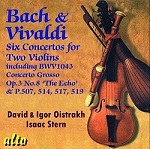 These
are old friends indeed – both the Bach and Vivaldi date from 1961 –
and, as usual, the question arises as to whether they can stand the
test of time. In fact they can and do to a much greater extent than
I had anticipated.
These
are old friends indeed – both the Bach and Vivaldi date from 1961 –
and, as usual, the question arises as to whether they can stand the
test of time. In fact they can and do to a much greater extent than
I had anticipated.
The Bach was recorded by DG and remains available on that label, with
the two Bach solo violin concertos, Beethoven’s Romances 1 and 2 and
the Brahms and Tchaikovsky violin concertos, with the RPO in Beethoven,
as in the Bach Double Concerto, the Vienna Symphony Orchestra and the
Staatskapelle Dresden, with Franz Konwitschny at the helm of the two
last named. (Originals 4474272, 2 CDs, mid-price). The Bach Double
Concerto is also available on mid-price DG Galleria E4198552,
coupled with earlier recordings of the two solo concertos which David
Oistrakh made with the Vienna Symphony Orchestra, as on the Regis CD
listed below.
There is another budget-price release in contention, from Regis, of
the three Bach concertos with two versions of Vivaldi’s Op.3/8, one
with Igor Oistrakh, as here, and the other with Isaac Stern. Rather
oddly, the Regis publicity material describes Igor as David’s father:
the boot is on the other foot, of course. (RRC1408). Despite
the apparent overlap, only the Oistrakhs’ Vivaldi Op.3/8 is common to
both recordings – full
details and review.
The 1961 DG recordings reproduced on Alto are superior in sound to the
older Dresden versions on Regis. Even the Berlin Classics reissue of
these sounds muffled by comparison – as streamed from Qobuz,
but don’t download there: the CD costs less – though, as it was presumably
made from the master tapes, it should be preferable to the Regis transfer
and the Alto to both.
In both versions of the opening movement of BWV1043 there were times
when I wanted to move the music along: at 4:11 (Alto) or 4:15 (Berlin
Classics) the overall time is noticeably slower than most period-instrument
recordings, but the chief problem lies in the fact that sometimes the
playing seems to fall behind the beat. I’m sure it’s an illusion, but
the impression does somewhat offset the beauty of the two soloists’
playing and the fact that it occurs on both recordings suggests that
it can’t be laid at the door of Eugene Goossens or Franz Konwitschny.
The slow movement, too, takes longer than we now expect – 7:26 and 7:49
respectively, as against 5:59 from Rachel Podger with Brecon Baroque
on Challenge Classics or 6:44 from Ryo Terakado and Masaaki Suzuki (BIS). There’s
a big but here, however: though I enjoyed the two period recordings
and another from Giuliano Carmignola and Mayumi Hirasaki with Concerto
Köln (DG), I was so moved by the two Oistrakh versions that I wanted
to sing or hum along. The soloists’ parts may not be marked cantabile,
but there’s a marked resemblance to Handel’s Ombra mai fù, though
it’s most improbable that Bach ever heard that aria. Heifetz pushes
the music along in this movement, equalling Podger’s 5:59. Known as
a speed merchant, he presses the first movement of the Brahms Violin
Concerto in such a way as to make this my benchmark version, but the
Oistrakhs really persuade me with their slower tempo in Bach. If you
do find their tempo too slow, I suggest sampling or streaming the classic
Arthur Grumiaux recording of the two solo concertos, the Double Concerto
with Herman Krebbers, and BWV1060 from Qobuz,
though I don’t recommend downloading from there for more than the cost
of the mid-price CD (Decca 4207002).
Similarly, while the Carmignola/Hirasaki account of the finale is exciting
(4:32) I also enjoyed the Oistrakhs’ more leisurely 5:15 on Alto.
This same recording of the Bach Double Violin Concerto is available
in a transfer by Beulah for a recent anthology entitled Violin Greats
(2PDR12) – Download
News 2015/7. There it’s coupled with David Oistrakh as soloist and
conductor in Mozart’s Violin Concerto No.3 and in Beethoven’s Romance
No.1, recorded with the RPO and Eugene Goossens at the same time as
the Bach, together with music by Saint-Saëns and Tchaikovsky. The Alto
CD is a little less expensive at around £6 – the Beulah can be downloaded
for £7.99 – but otherwise the choice can safely be left to the coupling:
I enjoyed both. The Beulah transfer is a little fuller but there’s not
much difference.
The Vivaldi recordings, apart from Op.3/8, were made by CBS/Columbia,
and they remain available at lower-mid-price on Sony Classical Originals
88697689612, coupled with The Four Seasons from around
the same period, hardly one of the great recordings of that work – significantly,
it first appeared on LP on the budget Fontana label (Ansel Brusilow,
violin).
Isaac Stern and Eugene Ormandy don’t look, on the face of it, like natural
Vivaldians, but the two had already recorded Op.3/8 on an earlier occasion,
in 1955, when they and Oistrakh happened to be in the recording studio
with time to spare after CBS had recorded Oistrakh in Mendelssohn, Mozart
and Bach, released in the UK on Philips ABL3138. That recording used
the Franko concoction of Op.3/8, inserting a movement from Bach’s solo
transcription of this work, which rightly annoyed Lucy Jeffery in reviewing
the Regis reissue. It now seems as irrelevant as Grützmacher’s meddling
with the best-known Boccherini Cello Concerto, despite Jacqueline du
Pré’s inexplicable decision to use that corrupt text. (The Very Best
of Jacqueline du Pré, Warner/EMI 5865972, 3 CDs at super-budget
price).
Wisely, I think, it’s the Oistrakh père et fils recording of
Op.3/8 which Alto have opted for to round off the new CD. It’s not necessary
to turn to recent period-instrument performances to note that the tempi
here are slow, especially the slow movement at 4:22 as against 3:11
from Neville Marriner and his Academy of St Martin-in-the-Fields on
what remains in many respects my favourite recording of Op.3, a two-for-one
Decca Duo set exemplifying Marriner’s attractive compromise between
period practice and modern instruments (E4434762).
The other four Vivaldi concertos were first released in 1961 on Fontana
SCFL1070, when they cost over £2 – at least £50 in today’s values –
for an LP playing for not much more than half the time of the new Alto
CD which sells for around £6. The harpsichordist, William R Smith, received
a special mention, as he did again on the 1975 mid-price LP reissue
from which I first came across them.
The solo performances are as brilliant as you might expect from two
such luminaries and there remains more to enjoy here than I had expected. The
playing of the Philadelphia is somewhat too plush for modern tastes
and the tempi rather relentless and unvaried but the recording quality
is better than I recall from the CBS reissue though no mention is made
of its having been licensed, so I presume that it’s taken from LP rather
than tape masters. Inevitably, with US recordings of this period, the
soloists are placed too far forward and there’s a hint of strain on
the top notes, perhaps redolent of transfer from LP – I recall a Shure
M97 cartridge having some problems with the rather glassy top of this
record – but the surface noise which I recall from the CBS reissue has
been tamed. The Sony transfer, as streamed from Qobuz,
is slightly less bright and with a rather more secure top line but there’s
very little in it.
The booklet gives us a great deal of biographical information about
the soloists, rather less about the composers and very little about
the music. It also leads the reader to believe that Eugene Goossens
conducted all the RPO recordings whereas I believe that David Oistrakh
directed them in the Vivaldi Op.3/8.
Small reservations apart, unless you prefer the coupling on the Beulah
reissue of the Oistrakhs in the Bach Double Concerto there’s a great
deal to enjoy here at the attractive budget price.
Handel at Vauxhall Volume 1
George Frideric HANDEL (1685-1759) Acis and Galatea, HWV49:
Sinfonia [3:36]
Daniel MOULT (b.1973) Organ Improvisation in the style of John
Worgan and Handel [0:59]
George Frideric HANDEL Organ Concerto Op.4/2 in B flat, HWV290
[9:40]
Acis and Galatea, HWV49: Ye verdant plains [0:42] – Hush, ye
pretty warbling choir! [5:43]
Thomas ARNE (1710-1778) Colin and Phoebe: A Pastoral –
Be still, O ye winds [3:34]
George Frideric HANDEL Saul, HWV 53: Dead March [3:06]
The Advice [2:10]
The Melancholy Nymph, HWV228/19 [3:35]
John HEBDEN (c.1712-1765) Concerto for Strings and Basso Continuo
No.1 in A [9:00]
George Frideric HANDEL L’Allegro, il Penseroso ed il Moderato,
HWV55: As steals the morn upon the night 6:12]
Eleanor Dennis (soprano), Kirsty Hopkins (soprano), Sophie Bevan (soprano),
Greg Tassell (tenor), Charles MacDougall (tenor), Benjamin Bevan (baritone)
Daniel Moult (organ)
London Early Opera/Bridget Cunningham
rec. May 2012, St Jude-on-the-Hill, Hampstead Garden Suburb, London.
DDD
texts included
SIGNUM SIGCD428 [48:17] – from hyperion-records.co.uk
(mp3, 16- and 24-bit lossless, with pdf booklet)
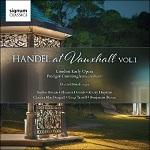 This
is the second of a planned series of six recordings by London Early
Opera; I reviewed the first, Handel in Italy I (SIGCD423)
in 2015/8.
The chief raison d’être of the earlier release was an alternative
recording of the long-lost Gloria which is worth mentioning in
the same context as Emma Kirby’s for BIS. There’s nothing of comparable
special significance on the new album but it’s all very enjoyable –
a reconstruction of the kind of concert which might have been heard
at London’s Vauxhall Gardens in which Handel’s music is interspersed
with works by Arne and Hebden – the only generally available recording
of both – and a brief improvisation in period style by the organist
Daniel Moult whose performance of the Handel Op.4/2 makes me hope to
hear more from him.
This
is the second of a planned series of six recordings by London Early
Opera; I reviewed the first, Handel in Italy I (SIGCD423)
in 2015/8.
The chief raison d’être of the earlier release was an alternative
recording of the long-lost Gloria which is worth mentioning in
the same context as Emma Kirby’s for BIS. There’s nothing of comparable
special significance on the new album but it’s all very enjoyable –
a reconstruction of the kind of concert which might have been heard
at London’s Vauxhall Gardens in which Handel’s music is interspersed
with works by Arne and Hebden – the only generally available recording
of both – and a brief improvisation in period style by the organist
Daniel Moult whose performance of the Handel Op.4/2 makes me hope to
hear more from him.
The performances and recording are as good as on the earlier release
and the booklet, containing a detailed essay on Vauxhall Gardens by
David Coke and notes on the music by Bridget Cunningham, is not the
least of the virtues of this second volume.
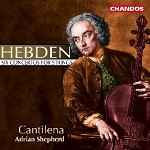
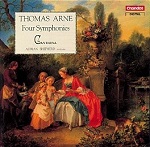 The
Chandos recording of Hebden’s six Concertos for strings and continuo
remains available only from their Archive service or as a download from
theclassicsalshop.net.
(CHAN8339 – rec. 1982 [55:54] mp3 and lossless, with pdf booklet).
The performances of this lively music from Cantilena directed by Adrian
Shepherd are good, though ensemble is less perfect than on the new Signum
recording.
The
Chandos recording of Hebden’s six Concertos for strings and continuo
remains available only from their Archive service or as a download from
theclassicsalshop.net.
(CHAN8339 – rec. 1982 [55:54] mp3 and lossless, with pdf booklet).
The performances of this lively music from Cantilena directed by Adrian
Shepherd are good, though ensemble is less perfect than on the new Signum
recording.
Cantilena on Chandos also offer the only available recording of Arne’s
four Symphonies (CHAN8403 – rec. 1984 [43:46] – from theclassicalshop.net,
mp3 and lossless, with pdf booklet). The performances could do with
more of a spring in their step but it’s not a major problem and they
are all that we have faute de mieux.
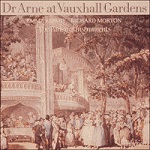
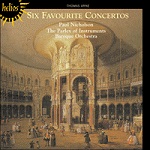 Best
of all these recordings of Arne is Dr Arne at Vauxhall Gardens,
a delightful recital of music which would have been performed there,
sung by Emma Kirkby and Richard Morton with the Parley of Instruments
and Roy Goodman (Hyperion CDA66237 – rec. [52:25] – from hyperion-records.co.uk,
mp3 and lossless with pdf booklet containing texts). It’s an ideal
follow-up to the Signum recording and it can be downloaded for just
£6.99. I need hardly report that the singing and support are first-rate.
Best
of all these recordings of Arne is Dr Arne at Vauxhall Gardens,
a delightful recital of music which would have been performed there,
sung by Emma Kirkby and Richard Morton with the Parley of Instruments
and Roy Goodman (Hyperion CDA66237 – rec. [52:25] – from hyperion-records.co.uk,
mp3 and lossless with pdf booklet containing texts). It’s an ideal
follow-up to the Signum recording and it can be downloaded for just
£6.99. I need hardly report that the singing and support are first-rate.
The Hyperion Helios recording of Six Favourite Concertos by Arne
has risen in price since I recommended it alongside the Vauxhall recording
in my review
of the Hyperion recording of Artaxerxes: it’s now £7.99 rather
than £5.99 but still a desirable purchase. Paul Nicholson directs the
Parley of Instruments from a variety of keyboard instruments – harpsichord,
virginals, organ and fortepiano. (CDH55251 – from hyperion-records.co.uk,
mp3 and lossless, with pdf booklet).
At 48 minutes Handel at Vauxhall I is a short-value release but
Hyperion make up for that with a price of just £5.99 (mp3 and 16-bit)
or £9.00 (24-bit). That’s slightly less generous than for SIGCD423
(£4.99 and £7.50 respectively) but still excellent value. Qobuz are
charging £7.99 for 16-bit only and without the booklet which Hyperion
provide, but subscribers
can stream from there.
George Frideric HANDEL (1685-1759)
The Musick for the Royal Fireworks, HWV351 (1749) [21:20]
Concerto a due cori No.3 in F, HWV334 (1747/8) [16:54]
Concerto a due cori No.1 in B flat, HWV332 (1747/8) [13:58]
Concerto a due cori No.2 in F, HWV333 (1747/8) [15:38]
Zefiro Baroque Orchestra/Alfredo Bernardini
a = 415Hz
rec. cloister of the Jesuit College, Catania (Italy), 14-17 August 2006.
DDD.
Reissue of Deutsche Harmonia Mundi recording released in 2008.
ARCANA A386 [68:57] – subscribers stream from Qobuz;
download
for £7.99, with pdf booklet
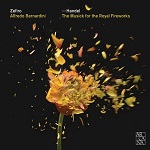 I
was rather perfunctory in dealing with this in 2015/9,
even allowing for the link
to Ralph Moore’s review. Now I’ve over-compensated and written too
much.
I
was rather perfunctory in dealing with this in 2015/9,
even allowing for the link
to Ralph Moore’s review. Now I’ve over-compensated and written too
much.
Comparative versions – Royal Fireworks (all with Water Music):
— DG Archiv Originals E4777562 (mid-price) or DG
Archiv Duo 4779987 (2 budget-price CDs) or 4791932 (complete
Handel Orchestral Music, 11 CDs): English Concert/Trevor Pinnock – review
of earlier release). The 2-disc set adds some valuable lesser-known
Handel.
— Decca E4557092 (budget-price 2-CD set) or 4786753
(50-CD budget-price set) Academy of Ancient Music/Christopher Hogwood
in Baroque Era (Bargain
of the Month – and Part 1 as download from 7digital.com)1
— Hyperion Helios CDH55375 (budget-price) King’s
Consort/Robert King – review
and DL
News April 2012/1.
— Naxos 8.557764 (budget price) Aradia Ensemble/Kevin
Mallon. Something of a ‘rogue’ entry, combining period instruments,
like the Hyperion, with some superfluous percussion. Hugely enjoyable
and my bargain recommendation along with the Hyperion.
— CPO 7773122 L’Arte del’Arco/Federico Guglielmo.
This version even enticed Margarida Mota-Bull, a self-professed non-Handelian
– review.
Though the physical product is a hybrid SACD, disappointingly there’s
no 24-bit download: mp3 or 16-bit lossless with pdf booklet from eclassical.com.
— Glossa GCDSA921616 Le Concert Spirituel/Hervé Niquet.
Well worth considering, though the SACD has reverted to full-price status.
The mid-price version (GCD921606 – DL
Roundup April 2012/1) is now download only – £7.99 in lossless sound
from classicsonlinehd.com,
but no booklet. Very lively performances but Niquet’s natural horns
are not the easiest on the ear.
The first recording of the Royal Fireworks that I got to know was from
Jean François Paillard and his Chamber Orchestra on World Record Club
ST270 2, coupled as on the Arcana reissue with two of the
Concerti a due cori, a decent version by which to get to know
the music, but I also fell even more under the spell of Charles Mackerras’s
classic 1959 Pye recording, also with one of the Concerti a due cori
and still available on Testament SBT1253 and in part (finale
only) on The Gift of Music CCLCDG1053. This is not to be confused
with his later EMI recording, until recently available as part of a
budget twofer and still available for download –
review – sample/stream from Qobuz.
Try the Overture from the Paillard and EMI/Mackerras recordings and
then the Bernardini reissue, Hogwood, Pinnock and King and the difference
in liveliness between the two former and four latter is immediately
apparent. It’s not just the faster tempi on the period-instrument performances.
In fact Paillard is actually slightly faster than Bernardini, who gets
off to a rather deliberate start here but matters very soon improve
and this is one of the liveliest versions without resorting to breakneck
tempi.
Though it’s a reissue, the Arcana recording remains at full price, so
the choice of bargain version rests between King and Mallon. I regularly
play both and I really can’t help you to decide between them except
to note that Mallon’s superfluous instrumentation in places may annoy
some listeners.
The difference between Bernardini and most of the other versions listed
is his inclusion of the three Concerti a due cori as coupling
– not only making it useful if you already have a favourite Water
Music but offering the chance to hear music which, while largely
cobbled together from Handel’s own works – some of the ‘borowings’ glaringly
obvious – makes sense in its own right. There are not too many recordings
of these and I can recommend from experience two complete versions,
from Marriner and Hogwood, both well worth having:
— ASMF/Neville Marriner on Australian Decca Eloquence 4801388
or Decca Collectors Edition 4583332, 11 CDs, download only, well
worth having in either format, especially if you prefer modern instruments,
albeit played with a sense of period style.
— AAM/Christopher Hogwood (on the 2-CD set).
— Bach Collegium Musicum Leipzig/Max Pommer offer a much
heavier-sounding recording of the three Concerti a due cori with
no coupling (Berlin Classics, download only).
— Trevor Pinnock performs Nos. 2 and 3 only as part of the
11-CD set or with his recording of the Coronation Anthems (DG
4472802).
Otherwise your choice between Marriner and Bernardini can safely be
made on the basis of the coupling. Chosen tempi are very similar, with
Marriner a little faster in places and often sounding livelier than
the timings indicate, as in the second movement of HWV332, cribbed from
‘And the glory of the Lord’ (Messiah), where Bernardini’s dancing
allegro non troppo, though mere seconds slower than Marriner’s,
actually sounds noticeably more deliberate. Marriner’s idea of divine
glory is sparkling and dancing, Bernardini’s more grandiose and sedate,
though not stodgy. Hogwood, again at much the same timing on paper,
achieves what you may consider the ideal balance. Though the sound of
the Bach Collegium Musicum (Berlin Classics) is heavier and not recommendable
overall, Max Pommer coaxes them to trip the light fantastic in this
movement.
All the versions which I have listed are well recorded, not least the
new Arcana. The Outhere mp3 press preview and the streamed version
from Qobuz sound well enough for me to be confident in recommending
the CD. The booklet is helpful and informative.
In summary: if you are looking for the standard coupling of Fireworks
and Water Music, there are two outstanding bargains on Hyperion
and Naxos and the 2-CD Pinnock or Hogwood sets. Niquet and Guglielmo
offer very lively performances at full price if you need SACD sound.
Those with a favourite version of the Water Music who either
don’t have the Fireworks or don’t mind duplicating that work
should be happy with the Arcana reissue, where they will also obtain
fine recordings of the derivative but very enjoyable Concerti a due
cori. If you choose the Arcana, Zefiro and Bernardini also perform
the Water Music with Telemann’s ‘Water Music’ (Hamburger Ebb
und Flut) on Naïve/Ambroisie. (AM901327: not available on
CD in UK, stream/download from classicsonlinehd.com).
1 Still a very worthwhile bargain despite price increase
since my review.
2 Available inexpensively from BnF – sample/stream/download
for £3.99 from Qobuz.
Giovanni Battista FERRANDINI (1709-1791) Al Santo Sepolcro
Il pianto di Maria Vergine: Cantata sacra da cantarsi dinanzi al
Santo Sepolcro (The lament of the Virgin Mary) [27:12]
O spettacolo pur troppo funesto: Cantata sacra [27:54]
Roberta Invernizzi (soprano)
L’Opera Stravagante, Gambe di Legno
rec. Chiesa di S. Croce Di Campese, 12-13 August 2008. DDD
FRA BERNARDO FB1401231 [55:06] – from eclassical.com
(mp3 and lossless, NO booklet). Booklet with texts and translations
available from Naxos
Music Library for subscribers. Subscribers stream from Qobuz.
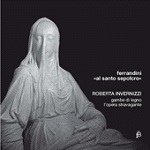 If
you bought the Decca Baroque Era 50-CD set or the 25-CD Volume
2 from that set – the latter no longer available – you already have
the recording of Il pianto with Bernarda Fink as soloist and
Il Giardino Armonico. Volume 2 is no longer available separately and
the CD containing the Ferrandini is now download or for streaming only:
at £11.56 the Qobuz download is rather expensive and there’s no booklet.
If
you bought the Decca Baroque Era 50-CD set or the 25-CD Volume
2 from that set – the latter no longer available – you already have
the recording of Il pianto with Bernarda Fink as soloist and
Il Giardino Armonico. Volume 2 is no longer available separately and
the CD containing the Ferrandini is now download or for streaming only:
at £11.56 the Qobuz download is rather expensive and there’s no booklet.
Like Bertali’s La Maddalena (above) the music was composed to
be sung in Holy Week before the symbolic sepulchre of Jesus where the
reserved sacrament would be ‘buried’ from Good Friday until the Easter
vigil Mass. It’s as beautiful and moving as Pergolesi’s Stabat Mater,
like which it contemplates the grief of Mary at her Son’s suffering.
The Decca recording is excellent but, if anything, Roberta Invernizzi
outdoes even Fink and she is very well supported and recorded.
Whereas the earlier recording adds music by other composers, Fra Bernardo
couple the work with another cantata on the theme of Christ’s Passion.
All the download providers treat this as the conclusion of Il pianto,
tracks 10-13, but it’s actually a separate work.
The eclassical.com download is the least expensive available ($9.92)
but it comes without booklet. The Qobuz and classicsonlinehd.com downloads
are slightly more expensive (£7.99 each); the Qobuz comes with the booklet
of texts and translations, which can also be obtained from Naxos Music
Library.
Franz SCHUBERT (1797-1828) Die schöne Müllerin, D795
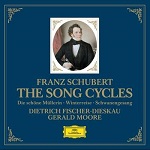 Reviewing
a recent less than ideal recording of Die schöne Müllerin on
Sheva led me to think about my favourite versions from the vast choice
on offer. Chief among these has to be Dietrich Fischer-Dieskau’s 1972
recording with Gerald Moore, available in an inexpensive 3-CD set with
Winterreise and Schwanengesang (4777956) or separately
(E4151862). The 3-CD set can be obtained for around £16 or $22
and I haven’t been able to find a download, even in mp3, for less than
£15.99* so I guess it has to be the box set. That’s a purchase that
no lover of Schubert is likely to regret – from Amazon
UK – Presto
– ArkivMusic**.
Reviewing
a recent less than ideal recording of Die schöne Müllerin on
Sheva led me to think about my favourite versions from the vast choice
on offer. Chief among these has to be Dietrich Fischer-Dieskau’s 1972
recording with Gerald Moore, available in an inexpensive 3-CD set with
Winterreise and Schwanengesang (4777956) or separately
(E4151862). The 3-CD set can be obtained for around £16 or $22
and I haven’t been able to find a download, even in mp3, for less than
£15.99* so I guess it has to be the box set. That’s a purchase that
no lover of Schubert is likely to regret – from Amazon
UK – Presto
– ArkivMusic**.
Fischer Dieskau’s 1951 and 1962 recordings, also with Gerald Moore,
are available at budget price – again, you’re unlikely to find a download
for less than the £5.50 or so that they cost.
— Regis RRC1383, super-budget price, rec. 1951 –
review
— Alto ALC1207, super-budget price, rec. 1962: with
Wanderers Nachtlied, etc. – review
The 1962 also comes on Warner Masters 0852092, mid-price, rec.
1962 – review
of earlier EMI GROC release. Here, too, with the CD available for around
£8 or less, it seems illogical that the least expensive download that
I have found costs £7.49 (mp3) or £8.99 (CD quality), again without
texts.
Subscribers to Qobuz will find their download prices uncompetitive but
can stream and enjoy the 3-CD set here,
the single DG here,
the Alto here
and the Warner here.
No texts with any.
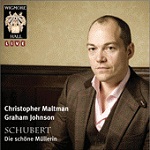 There’s
another very fine baritone recording: Christopher Maltman and Graham
Johnson, recorded live at the Wigmore Hall in December 2010 (WHLIVE0044
). John Quinn liked this very much – review.
Here again, however, it has to be the CD: the Qobuz stream to which
I listened is marred by some very intrusive bumps and bangs which makes
me suspicious that all downloads may be equally afflicted. The Naxos
Music Library version seems free of these and comes with the booklet
but their partners at classicsonlinehd.com don’t offer it as a download.
There’s
another very fine baritone recording: Christopher Maltman and Graham
Johnson, recorded live at the Wigmore Hall in December 2010 (WHLIVE0044
). John Quinn liked this very much – review.
Here again, however, it has to be the CD: the Qobuz stream to which
I listened is marred by some very intrusive bumps and bangs which makes
me suspicious that all downloads may be equally afflicted. The Naxos
Music Library version seems free of these and comes with the booklet
but their partners at classicsonlinehd.com don’t offer it as a download.
Maltman moulds and tempers his voice to the music and he’s most sensitively
accompanied, as one would expect with Johnson at the keyboard. The
presence of the latter is one reason for the success of the Hyperion
Schubert Edition, not least of their recording of Die Schöne Müllerin,
with Ian Bostridge as soloist, available at mid-price on CDA30020,
with Fischer-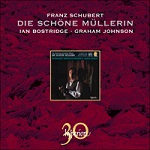 Dieskau
reading those poems from the cycle which Schubert didn’t set – see Download
News October 2010.
Dieskau
reading those poems from the cycle which Schubert didn’t set – see Download
News October 2010.
There are several other very fine tenor recordings: Jonas Kaufmann and
Helmut Deutsch (Decca – stream from Qobuz
with booklet, but their download is over-priced), James Gilchrist and
Anna Tilbrook (Orchid – review
–
review: stream from
Qobuz, no booklet), Christoph Prégardien and Michael Gees (Challenge
Classics – review:
stream from Qobuz,
no booklet). Most of the downloads on offer are over-priced and/or
come without the booklet: the Hyperion, with texts, would be my overall
download recommendation except that it costs £8.99 when you can purchase
the CD direct
from Hyperion for £5.
* £14.99 from Amazon but at less than full bit-rate and without texts.
** The same recordings in a limited edition with a different catalogue
number and cover.
Max BRUCH (1838-1920) Works for Violin and Orchestra
Violin Concerto No.2 in d minor, Op.44 (1877) [26:30]
In Memoriam, Op.65 (1893) [13:40]
Konzertstück, Op.84 (1910) [18:21]
Ulf Wallin (violin)
Deutsches Symphonie-Orchester Berlin/Okko Kamu
rec. Jesus-Christus Kirche, Berlin-Dahlem, May 2014. DSD.
BIS BIS-SACD -2069 [59:41] – from eclassical.com
(mp3, 16- and 24-bit lossless with pdf booklet). Reviewed from SACD
– see also review
by Michael Cookson.
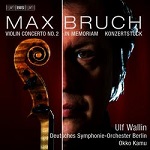 Max
Bruch never quite repeated the success of his well-known Violin Concerto
No.1, though he came close with the Scottish Fantasy which I
must admit to enjoying for a good wallow. The works on this new recording
don’t challenge either in terms of instant appeal but they have had
their advocates, some of them persuasive. The oldest of these, from
Salvatore Accardo, with the Leipzig Gewandhaus Orchestra and Kurt Masur,
offers Bruch’s three Violin Concertos, the Scottish Fantasy and
the Serenade in a minor at budget-price (Decca Duo 4621672, 2
CDs).
Max
Bruch never quite repeated the success of his well-known Violin Concerto
No.1, though he came close with the Scottish Fantasy which I
must admit to enjoying for a good wallow. The works on this new recording
don’t challenge either in terms of instant appeal but they have had
their advocates, some of them persuasive. The oldest of these, from
Salvatore Accardo, with the Leipzig Gewandhaus Orchestra and Kurt Masur,
offers Bruch’s three Violin Concertos, the Scottish Fantasy and
the Serenade in a minor at budget-price (Decca Duo 4621672, 2
CDs).
A recent CPO release coupled Violin Concerto No.2 with the Scottish
Fantasy: David Barker and I reviewed that separately in Download
News 2015/7 and that’s a strong recommendation. I also mentioned
in the same DL News the recent Chandos reissue of Lydia Mordkovitch’s
recordings of Nos. 2 and 3, with Richard Hickox (CHAN10865X).
I like that but David Barker had more reservations than me and you should
also read his review.
Michael Cookson has already reviewed
the new BIS recording in positive terms. I’m in agreement with all
that he writes about Ulf Wallin’s warmly romantic playing, the quality
of the support he receives and the fact that lovers of Bruch’s music
should be well contented with this release. Violin Concerto No.2 is
by no means to be sniffed at and though I don’t recall hearing the Konzertstück
before, originally planned as a fourth Violin Concerto, that struck
me as the most impressive work on the album, recapturing some of the
intensity of the famous First Concerto.
I played the 2-channel SACD layer as well as the CD layer to which MC
listened. There is no perceptible difference between the 24-bit download
and the stereo SACD layer. The eclassical.com download comes with pdf
booklet: at $14.31 ($8.95 for mp3 and 16-bit) that’s less than you would
pay for the SACD – the per-second charging policy in this case compensates
for the slightly short playing time.
As well as the Mordkovich recording of Concertos Nos. 2 and 3 on Chandos,
there’s also a coupling of Concerto No.3 and the Scottish Fantasy
by Jack Liebeck with the BBC Scottish SO and Martyn Brabbins (Hyperion
CDA68050). I had reservations about the tempo of the opening
movement of the concerto and the over-rhapsodic approach to the Fantasy
– Download
News 2014/12 – but David Barker had much more serious reservations
– review.
Bargain lovers are well served by that Accardo-Masur twofer, especially
those who don’t have Bruch’s Violin Concerto No.1, usually paired with
Mendelssohn, but those who insist on 24-bit sound will prefer the new
BIS recording and others should be well pleased with it.
Josef SUK (1874–1935)
Fantasy in g minor for Violin and Orchestra, Op.24 [23:16]
Antonín DVOŘÁK (1841–1904)
Violin Concerto in a minor, Op.53, B103 [30:20]
Romance in f minor for Violin and Orchestra, Op.11, B39 [12:27]
Christian Tetzlaff (violin)
Helsinki Philharmonic Orchestra/John Storgårds
rec. Helsinki Music Centre, Finland, 29 September–2 October 2015. DDD/DSD
ONDINE ODE12795 [66:03] – from emusic.com
(mp3 and lossless, with pdf booklet)
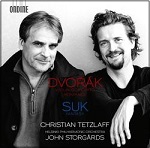 The
classic Josef Suk and Karel Ančerl Supraphon recording of the Dvořák
Violin Concerto originally came with just the Romance as coupling
but it’s now available (download only) with son-in-law Josef Suk’s Fantasy,
as on the new recording (Supraphon Ančerl Gold SU36682 –
Recording of the Month: review
– from
emusic.com or stream
(subscribers) from Qobuz, no booklet from either).
The
classic Josef Suk and Karel Ančerl Supraphon recording of the Dvořák
Violin Concerto originally came with just the Romance as coupling
but it’s now available (download only) with son-in-law Josef Suk’s Fantasy,
as on the new recording (Supraphon Ančerl Gold SU36682 –
Recording of the Month: review
– from
emusic.com or stream
(subscribers) from Qobuz, no booklet from either).
This recording kept me contentedly entertained, along with a large cappuccino,
for the first hour of a 2½-hour wait while my better half was shoe shopping
in Bluewater shopping centre. I don’t think it was just the assistance
it gave in preventing boredom that made me warm very much to the performance.
It may appear that at 9:48 the new recording rushes the slow movement
of the concerto – Suk and Ančerl took 11:33 and Suk and Neumann
on the other Supraphon recording took 10:29 – but in practice there
is no sense of undue haste in this beautiful performance.
Even as heard in flac from my Sony Walkman with a pair of noise-reducing
Sennheiser ’phones the sound is very good too. It sounds better still,
of course, at home on the audio system. There doesn’t appear to be
a 24-bit download but the recording is also available from dealers as
a hybrid SACD.
Ralph VAUGHAN WILLIAMS (1872-1958) The Lark Ascending [14:20]
Fantasia on a Theme by Thomas Tallis [16:03]
Sir Edward ELGAR (1857-1934) Serenade for String Orchestra, Op.20
[12:40]
Salut d’amour, Op.12 [3:19]
Chanson de Matin, Op.15/2 [3:23]
Chanson de Nuit, Op.15/1 [4:26]
In Moonlight (from In the South, Op.50, arr. Julian
Milone) * [3:15]
Introduction and Allegro [14:25]
Pinchas Zukerman (violin and viola)
Royal Philharmonic Orchestra
rec. Cadogan Hall, London, 8-9 September 2015. DDD
* world premiere recording
DECCA 4789386 [71:49] – subscribers stream from Qobuz
with pdf booklet. Downloads for all sources uncompetitive in price.
CD from Amazon
UK – Presto
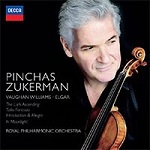 Pinchas
Zukerman is revisiting The Lark Ascending (DG Eloquence 4428333).
He’s also a well-established Elgarian, having recorded the Violin Concerto
with Zubin Mehta (Helicon HEL029655) and with Leonard Slatkin
(Sony 88883737202, 4 CDs).
Pinchas
Zukerman is revisiting The Lark Ascending (DG Eloquence 4428333).
He’s also a well-established Elgarian, having recorded the Violin Concerto
with Zubin Mehta (Helicon HEL029655) and with Leonard Slatkin
(Sony 88883737202, 4 CDs).
I’ve tended to be a little sniffy about the immense popularity of The
Lark Ascending, wondering why it seems to be preferred to the beautiful
Tallis Fantasia. Here we have both and they are very well performed:
if any recording were to persuade me to understand why the ClassicFM
listeners regularly vote The Lark as their Number 1, this might
be it. Zukerman’s tone may be slightly less plush than 40 years ago
but the music gains by being given slightly more air in which to ascend
on the new recording. The Tallis Fantasia still outshines it,
in a performance which rivals my old favourites.
One of those abiding favourites, from Sir John Barbirolli and the Sinfonia
of London, is coupled as here with the Elgar Serenade andIntroduction
and Allegro (Warner Masters 0851872: 5-star
review of earlier GROC release). Unthinkable as it may seem, I
found myself enjoying all three works almost as much as on the classic
Barbirolli album and though that has come up sounding very well for
a 1960s recording* the new Decca inevitably sounds even better. At
a very slightly slower speed than Barbirolli and around the same as
Elder (below) Zukerman caresses the music just as much as the former,
apart from a short section a little after nine minutes into the work
where the RPO sound a little plodding. Overall they fail quite to achieve
the same warmth of string tone and unanimity of purpose as the Sinfonia
of London.
Sir Mark Elder with the Hallé in The Lark Ascending is a rare
disappointment (English Landscapes CDHLL7512 – review).
Otherwise his recordings of this repertoire offer fine modern alternatives
to Barbirolli: Tallis Fantasia with Symphony No.3, etc (CDHLL7540:
Recording of the Month –
review); Serenade for Strings andChanson de Matin
with Cockaigne and Enigma (CDHLL7501); Introduction
and Allegro with Symphony No.2 ( CDHLL7507: Recording of the
Month – review).
Even if you have all those very fine recordings you may well prefer
the way that all these works are brought together on the new Decca album.
* The lossless (flac) download which I recommended from Passionato some
time ago – October
2009 – is no longer available and the Qobuz alternative, though
well
worth streaming by subscribers, is over-priced at £9.09 and sans
booklet: more than you would pay for the CD. Presto
offer the disc for £8.50 but charge £0.02 extra for mp3 and £11.08 for
the lossless download, again without booklet. As so often, I’m baffled
by the ‘logic’ which has again turned much of this Download News into
a warning against over-expensive download versions!
Claude DEBUSSY (1862-1918) Chamber Music
String Quartet in g minor, Op.10, L85 [24:13]
Syrinx for solo flute, L129 [2:49]
Sonata for cello and piano in d minor, L135 [13:03]
Sonata for flute, viola and harp in F, L137 [17:15]
Sonata for violin and piano in g minor, L140 [14:00]
Kuijken Ensemble [Sigiswald Kuijken (violin, viola); Veronica Kuijken
(violin); Sara Kuijken (viola); Wieland Kuijken (cello); Barthold Kuijken
(flute); Piet Kuijken (Érard piano); Sophie Hallynck (Érard harp)]
rec. Centre culturel, Lommel, Belgium, 12–17 September 1999.
ARCANA A392 [71:20] – from eclassical.com
(mp3 and lossless with pdf booklet)
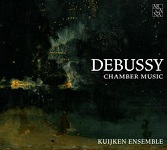 This
recording was first released on Arcana A303 in 2000. The cover image
has changed but the reissue remains at full price, so the eclassical.com
download represents a significant saving and comes with the booklet.
Though the Kuijken family are best known for their performances of baroque
music, there’s no sense that they are attempting a historical reconstruction
here: the instruments range from 1804 (Veronica Kuijken’s violin) to
1999 (a cello made by Filip Kuijken, yet another talented member of
this family). The 1894 Érard piano is a touch more dry-sounding than
you may be used to in the cello and violin sonatas.
This
recording was first released on Arcana A303 in 2000. The cover image
has changed but the reissue remains at full price, so the eclassical.com
download represents a significant saving and comes with the booklet.
Though the Kuijken family are best known for their performances of baroque
music, there’s no sense that they are attempting a historical reconstruction
here: the instruments range from 1804 (Veronica Kuijken’s violin) to
1999 (a cello made by Filip Kuijken, yet another talented member of
this family). The 1894 Érard piano is a touch more dry-sounding than
you may be used to in the cello and violin sonatas.
This might not be my first choice for the wonderful String Quartet,
a work which I got to know from a Supraphon LP, a very fulsome performance
from the Vlach Quartet coupled with the Ravel Quartet, which I almost
wore out (SUAST50040, briefly available on CD – stream or download from
Qobuz).
The Kuijkens’ performance is not quite so ripe, which some may prefer:
they certainly play the work with affection and it’s very handy to have
all Debussy’s chamber music coupled like this.
Jean SIBELIUS (1865-1957)
The Sibelius Edition - Volume 8: Orchestral Works
Violin Concerto (original and revised versions), concertante works,
suites and lighter pieces
Leonidas Kavakos (violin); Dong-Suk Kang (violin); Jaakko Kuusisto (violin);
Marko Ylönen (cello); Raimo Laukka (baritone); Soloists: Heikki Laitinen
and Taito Hoffren (folk singers)
Lahti Symphony Orchestra/Osmo Vänskä
Gothenburg Symphony Orchestra/Neeme Järvi
rec. 1982-2008, Lahti, Finland; Gothenburg, Sweden. DDD
BIS-CD-1921-23 [420:03] – from eclassical.com
(mp3 and lossless with pdf booklet)
6 CDs for the price of 3: for details please see review
by Rob Barnett.
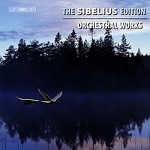 This
is more by way of a reminder than for the sake of saying anything much
new. Rob Barnett wrote a detailed analysis of this set when it appeared
on disc in 2009 – review
and track details – but it now represents even better value as one
of the downloads which BIS made available from their eclassical.com
website in Sibelius’s 150th anniversary year. The discs
are still available for around £38/$65 but the download set, in mp3
and 16-bit lossless sound, complete with pdf booklet, now costs just
$37.78. If this was a set that you had had your eyes on but baulked
at the size and cost, even though the 6 CDs are offered for the price
of three, this is your chance to snap it up even less expensively.
UK readers may find that the Qobuz
price of £23.99 is very slightly less expensive still. It’s not available
for streaming from Qobuz but it is for subscribers from
Naxos Music Library and in 16- and 24-bit from classicsonlinehd.com:
their price for 16-bit is uncompetitive at £47.99 and their 24-bit an
eye-watering £95.99.
This
is more by way of a reminder than for the sake of saying anything much
new. Rob Barnett wrote a detailed analysis of this set when it appeared
on disc in 2009 – review
and track details – but it now represents even better value as one
of the downloads which BIS made available from their eclassical.com
website in Sibelius’s 150th anniversary year. The discs
are still available for around £38/$65 but the download set, in mp3
and 16-bit lossless sound, complete with pdf booklet, now costs just
$37.78. If this was a set that you had had your eyes on but baulked
at the size and cost, even though the 6 CDs are offered for the price
of three, this is your chance to snap it up even less expensively.
UK readers may find that the Qobuz
price of £23.99 is very slightly less expensive still. It’s not available
for streaming from Qobuz but it is for subscribers from
Naxos Music Library and in 16- and 24-bit from classicsonlinehd.com:
their price for 16-bit is uncompetitive at £47.99 and their 24-bit an
eye-watering £95.99.
I should say at once that there is a great deal of music here that is
less than Sibelius’s best and some which he thought better of, though
that second category also applies to what most listeners will find the
most interesting part of the collection: the two versions of the Violin
Concerto. The familiar version on CD3, as published in 1905, runs to
34:44; the original from 1903-4 adds almost a further five minutes (39:15).
Both versions are performed by Leonidas Kavakos with the Lahti Symphony
Orchestra who, under the direction of Osmo Vänskä, also provide most
of the recordings in this set.
That original version is on CD6, a disc of preliminary and alternative
versions, including the Paris version of Rakastava, another work
which should be in any Sibelius collection. When first released on
BIS-CD-500 the two versions of the concerto came on the same
album but you probably wouldn’t want to hear them one after the other,
so the arrangement in this collected edition is preferable. As with
the original version of Vaughan Williams’ Symphony No.2, the ‘London’
Symphony, authorised as a one-off for recording by Richard Hickox on
Chandos, there’s a strong case for hearing the original.
As the BIS notes make clear, the revision was made chiefly to remove
the most difficult passages, the first, flawed, performance having been
entrusted to a less experienced soloist, so you may well choose to make
this your preferred listening. If you don’t have that single-disc release,
it will cost $11.25 even to download it, more than a third of the cost
of the complete Volume 8.
The BIS recording of the original version of the Karelia Suite also
remains available separately on BIS-CD-918, with the original scoring
of the incidental music to King Christian II and Pelleas and
Melisande,* so it’s surprising that we have only the regular version
here, albeit with a reconstructed version of the complete Karelia
music which includes the familiar items and more (from BIS-CD-915).
The Suite comes in a recording not available before, another
reason to go for Volume 8.
There’s a good deal here that you may not wish to hear very often, but
there’s also much that you probably will. With first-rate performances,
excellent recording and a booklet which comes as part of the deal there’s
a great deal to like.
If, however, the multi-volume complete BIS Sibelius seems like too much
of a good thing, you may think another BIS offering more to your taste:
The Essential Sibelius comes in the form of 15 CDs for the price
of four (BIS-CD-1697/1700). Most of the performances are the
same Lahti/Vänskä versions, though the Karelia Suite is directed
by Neeme Järvi. You get all the symphonies, all the familiar works
and more besides, but only the regular version of the Violin Concerto.
I should warn that, by another of those quirks which dog the pricing
of downloads, eclassical.com charge $168.55 to download The Essential
Sibelius, which can be yours for less than £50/$90 on disc. On
this occasion – but not always – Qobuz
offer the best value: sample/stream or download in lossless quality
for £15.99, but without booklet.
Even less expensive at just £6.99 is a 7½ hour collection of these BIS
Lahti/Vänskä recordings of all the symphonies, Violin Concerto, Finlandia,
Tapiola, En Saga, Snöfrid, complete Lemminkäinen
and Karelia Suite. If you don’t mind Amazon’s less-than-ideal
mp3 bit-rate, around 220kb/s – some tracks are at the full 320kb/s –
it doesn’t sound too bad at all: ignore the one-star review – the writer
obviously hit the wrong button because the actual comment is very favourable.
From Amazon
UK: even better value at $7.99 from Amazon
US. Please see June
2011/2 DL Roundup: Bargain of the Month. It’s gone up £1 since
then but it’s still an excellent bargain.
That’s the least expensive way to obtain Osmo Vänskä’s Lahti recordings
of all seven symphonies, which I mostly prefer to his more recent remakes,
but if you must have lossless sound, Volume 12 has been released as
an eclassical download: 5 CDs containing both versions of No.5 plus
fragmentary earlier versions of some of the symphonies –details
and review – or you can choose BIS-CD-1286/88, 4 CDs for
the price of two, containing all the symphonies, with Tapiola
and the original and regular versions of No.5, around £30 on CD or $42.27
as a download from eclassical.com
–
review. Qobuz
have Volume 12 for £15.99: sample/stream/download with 129pp. pdf booklet
– review
and Download
News 2013/4.
Volume 12 may be the chief must-have for most Sibelians but Volume 8
is by no means to be sniffed at.
* both already available on Volume 5: Theatre Music (BIS-CD-1912/14)
– review.
Jean SIBELIUS (1865-1957)
Pelléas et Mélisande – Complete incidental music, JS 147 (1905)
[33:34]
Musik zu einer Szene (1904) [6:29]
Valse lyrique, Op. 96a (1921) [4:47]
Autrefois – Scène pastorale, Op. 96b (1919)* [5:36]
Valse chevaleresque, Op. 96c (1921) [4:47]
Morceau romantique sur un motif de Monsieur Jakob von Julin,
JS 135/a (1925) [2:35]
Pia Pajala (Soprano); Sari Nordqvist (mezzo-soprano)*
Turku Philharmonic Orchestra/Leif Segerstam
rec. Turku Concert Hall, Turku, Finland, 20-24 January, and 8-12 September
2014. DDD.
Texts and translations included.
NAXOS 8.573301 [57:47] - from eclassical.com
(mp3, 16- and 24-bit lossless, all with pdf booklet). Also available
on CD and as 16- and 24-bit downloads and for streaming from classicsonlinehd.com.
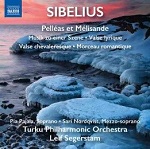 ‘The
playing is as stylish and sympathetic as you might expect from a Finnish
orchestra and conductor’. See review
by Gwyn Parry-Jones.
‘The
playing is as stylish and sympathetic as you might expect from a Finnish
orchestra and conductor’. See review
by Gwyn Parry-Jones.
This is not, perhaps, quite so urgent a recommendation as the Naxos
Belshazzar’s Feast, also conducted by Leif Segerstam (8.573300
– DL
News 2015/7) but it’s not far behind; I enjoyed hearing it.
Excerpts from Pelléas at Mélisande are not hard to find – the
opening movement was a Beecham lollipop* and has become familiar
to television viewers from many years of exposure – but the complete
music is not so easy to come by: the chief rival to the new Naxos comes
in a near-complete suite of nine items from Neeme Järvi on BIS, on a
single CD with Symphony No.6, or as part of The Essential Sibelius,
15 CDs for around the price of four (BIS-CD-1697-1700). That
set represents excellent value – especially if you download it from
Qobuz
for £15.99 – but you may well have the Lahti/Vänskä symphony recordings
which form the main ingredient. The same nine-item suite has also been
extremely well recorded by the Iceland Symphony Orchestra and Petri
Sakari, with theSwanwhite Suite and King Christian incidental
music (Chandos CHAN9158 – rec. 1992 [79:18] – from theclassicalshop.net,
mp3 and lossless with pdf booklet).
The original scoring of the complete score, recorded by Osmo Vänskä,
also forms part of Volume 5 of the BIS Sibelius Edition (BIS-CD-1912-14,
6 CDs for the price of three – review).
Download, with pdf booklet, from eclassical.com
(mp3 and lossless).
On CD you should find this recording for around £6, so there’s little
advantage in pricing terms in downloading the 16-bit, but if you want
24-bit eclassical.com ($15.61) and classicsonlinehd.com (£9.99) both
offer very fair value. The recording is good enough to be worth obtaining
in the 24-bit version to which I listened.
* Beecham recorded eight items from Pelléas, still sounding fresh
on an EMI Great Recordings CD with Oceanides and Symphony No.7
but, incredibly, apparently download only – from Presto.
Warner must surely reissue it.
Sergei RACHMANINOV (1873-1943)
Symphony No.3 in a minor, Op.44 [43:26]
Mili BALAKIREV (1837-1910)
Symphonic Poem ‘Russia’ [13:04]
London Symphony Orchestra/Valery Gergiev
rec. live. Barbican, London, November 2014. DDD/DSD
LSO LIVE LSO0779 [56:30] – from hyperion-records.co.uk
(mp3 16- and 24-bit lossless and from dealers on Hybrid SACD.) Subscribers
stream from classicsonlinehd.com
(16- and 24-bit)
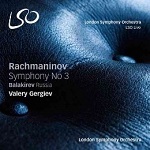 ‘A
dreary Third; the dry, rather close sound is a turn-off too’. See review
by Dan Morgan and review by Leslie Wright: ‘I was really disappointed,
because I know that Gergiev can turn out stunning versions of the Russian
standards’.
‘A
dreary Third; the dry, rather close sound is a turn-off too’. See review
by Dan Morgan and review by Leslie Wright: ‘I was really disappointed,
because I know that Gergiev can turn out stunning versions of the Russian
standards’.
Comparative versions:
— Sony Essential Classics SB2K63257: Philadelphia Orchestra/Eugene
Ormandy (Symphonies 1-3; Vocalise) – review.
Download only – see below.
— Beulah 1PD81: Moscow Radio Symphony Orchestra/Yevgeny
Svetlanov (with Symphonic Dances: Moscow PO/Kondrashin). [65:51] Download
from
Qobuz or Amazon
US.
— Chandos CHAN10234X: London Symphony Orchestra/Neeme Järvi
– rec. 1987/1991 (with Symphonic Dances: Philharmona/Järvi) [79:11]
A reissue at an attractive price – download from theclassicalshop.net
(mp3 and lossless with pdf booklet) but NB: the CD can be found
for significantly less than the lossless download.
— EMI/Warner 5008852: St Petersburg Philharmonic Orchestra/Mariss
Jansons (Symphonies 1-3, Symphonic Dances, Isle of the Dead,
etc., 3 CDs, or Warner 2564227827, with Piano Concertos, 5 CDs)
The Ormandy recording remains my benchmark, yet, incredibly, it seems
no longer to be available in the UK on CD: the best option would seem
to be to download Symphonies 1-3 and Vocalise in lossless sound
for £12.89 from
Qobuz – subscribers
can also stream. There is no booklet, but this is the version that
I keep returning to, with the orchestra whose sound Rachmaninov envisaged
when he composed the music, and the recording still sounds very well
indeed.
Classicsonlinehd.com
have the Naxos Classical Archives transfer of the older (1954) Ormandy
recording of Symphony No.3 and Vocalise (9.80343) but
whereas the old Classicsonline offered this for just £1.99, it now costs
£4.99. Subscribers to emusic.com
will find it on sale there for £1.68. As streamed in lossless sound
from classicsonlinehd.com,
it’s rather dry in timbre but more than tolerable. There’s also a rather
shrill BnF transfer of the 1954 recording which clumsily tacks Vocalise
onto the finale without telling you: £1.99 from Qobuz.
For Järvi and Jansons, please see DL
Roundup December 2011/1. The classicsonline.com link for the Janssons
set no longer applies: 7digital.com
have the 3-disc set in mp3 for £7.49 but the target price for the CDs
is £7.20.
Gergiev is no novice in recording the Rachmaninov symphonies. There’s
a Newton Classics release on which he conducts the Kirov Orchestra in
the second symphony, which John Quinn liked – review
– and he also recorded that symphony with the LSO for LSO Live. I liked
many aspects of that recording, too, not least the fact that the symphony
is recorded without cuts, but there are more than a few idiosyncrasies,
such as the addition of a timpani stroke at the end of the first movement
– DL
Roundup August 2010 – so that I think that we are better served
by Rozhdestvensky with the LSO (now transferred from Regis to Alto ALC1260,
but still at budget price) or Previn, also with the LSO but omitting
the exposition repeat in the first movement (EMI 0852892, mid-price).
The Third Symphony is not quite as immediately attractive as its predecessor
or, indeed, the second and third piano concertos, but it’s not far behind.
The secret of obtaining an ideal performance is first to have a world-class
orchestra for a work designed to be premiered in Philadelphia. The
LSO at their best were and remain in that class and with Järvi (Chandos),
they deliver the second ingredient: the power of the music.
The third ingredient is to deliver the dreamier side of the work without
quite drifting into schmalz, a task in which Järvi doesn’t entirely
succeed. Gergiev, on the other hand, delivers this ingredient, often
to the exclusion of the more exciting aspects. Don’t misunderstand
me; I’m as happy to wallow in the smoochy aspects of Rachmaninov as
anyone, but it isn’t the whole picture and it needs to be integrated
with the barnstorming bits. In his recent recordings with both the
LSO and Mariinsky Orchestra I have sensed that Gergiev has been unduly
keen to play down any tendency to go over the top, as on his recent
Harold in Italy – review
– and that’s the case here, too.
Reissue of the Month
British Violin Concertos
Sir Arnold BAX (1883-1953) Concerto for Violin and Orchestra
[35:15]
Sir George DYSON (1883-1964) Violin Concerto [43:14]
Sir Arthur BLISS (1891-1975) Concerto for Violin and Orchestra
[41:48]
John VEALE (1922-2006) Violin Concerto [35:38]
Lydia Mordkovitch (violin)
London Philharmonic Orchestra; City of London Sinfonia; BBC National
Orchestra of Wales; BBC Symphony Orchestra/Bryden Thomson; Richard Hickox
CHAN 241-53 [78:39 + 77:36] – from theclassicalshop.net
(mp3 and lossless, with pdf booklet)
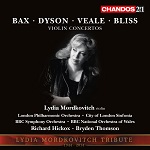 ‘There
are many rewards to be had here’. See review
by Stephen Greenbank.
‘There
are many rewards to be had here’. See review
by Stephen Greenbank.
Following my brief recommendation in 2015/7 I started to write a long
review for the main MusicWeb pages; I never completed it but I’ve raided
my notes to add to what I wrote then.
This is one of a number of recordings which Chandos have reissued inexpensively
as a tribute to Lydia Mordkovitch, who died in 2014, in this case in
their 2-for-1 series. I very much enjoyed it. It’s emphatically not
just for Mordkovitch’s many admirers, but purchasers are faced with
a very difficult choice of having the concertos together on this twofer
or in the company of other works by the same individual composer on
the original couplings, themselves often twofers or otherwise inexpensive
offerings.
This recording of the Bax Violin Concerto is also available at lower
mid-price on CHAN10154X, with the Cello Concerto and Morning
Song for piano and orchestra. The only other current rival comes
from a recent Lyrita 2-CD release of off-air recordings of British Violin
Concertos: the Bax is performed by André Gertler and the BBCSO with
Sir Malcolm Sargent, recorded in 1957 (REAM2114 - review).
The Dyson Violin Concert is coupled with his Children’s Suite
and other music on another Chandos twofer, CHAN10377X. The Bliss
concerto is taken from CHAN10380, where it’s coupled with the
Colour Symphony.
John Veale’s Violin Concerto is coupled with Benjamin Britten’s on CHAN9910.
This is the only work where I am not torn between recommending the new
recording or the alternative couplings: good as Mordkovitch’s Britten
is, there is a more recent Chandos alternative from Tasmin Little and
Edward Gardner with the BBC Philharmonic, available in 24-bit sound
as well as on CD and in mp3 and lossless downloads (CHAN10764:Recording
of the Month – review
– review).
The other reissues, all at lower mid-price, are:
— CHAN10864X: SHOSTAKOVICH Violin Concertos 1 and
2 – CD, or download from theclassicalshop.net
(mp3 and lossless, with pdf booklet). This is a direct reissue of
CHAN8820, of which I wrote in June
2009: “Though my allegiance to David Oistrakh’s various recordings
remains undiminished, this 1989 recording offers very fine performances
in unquestionably better sound. I’ve even seen it claimed that Lydia
Mordkovich’s performance of the second concerto makes it sound almost
the equal of the first. I wouldn’t go that far, but she and Järvi,
ably abetted by the RSNO before they earned the ‘Royal’ tag, certainly
made me take much more notice of a work which can seem something of
an anti-climax after the powerful first.” This recording was among
the top recommendations at full price; at the new price it’s even more
worth considering, especially as the inexpensive Documents reissue of
the Oistrakh recordings which I mentioned is no longer available and
the Regis reissue of Violin and Cello Concertos No.1 (RRC1385)
is now download only.
— CHAN10865X: BRUCH Violin Concertos 2 and 3 – CD,
or download from theclassicalshop.net
(mp3 and lossless, with pdf booklet). From CHAN9738. Nos. 1 and 3
on CHAN9784. There’s no mistaking the fact that these concertos are
less memorable than the more famous First and the Scottish Fantasy
but I did enjoy hearing these performances, which make a strong case
for them. See, however, David Barker’s reservations, mentioned in my
review of the Accardo recording of Bruch (BIS above).
— CHAN10866X: Poème – The Artistry
of Lydia Mordkovitch. CHAUSSON Poème and Chamber works
by RAVEL (the posthumous Violin Sonata), ELGAR (Sospiri),
SHOSTAKOVICH, etc. – CD, or download from theclassicalshop.net
(mp3 and lossless, with pdf booklet). Partly drawn from CHAN8748.
A number of other Mordkovitch recordings remain at full price, presumably
due to join the lower-price reissues in due course.
Jacques IBERT (1890–1962)
Escales (Ports of Call) (1922) [15:03]
Sarabande pour Dulcinée for orchestra for the film Don Quichotte
(1933) by Georg Wilhelm Pabst (1932) [3:33]
Ouverture de fête (1940) [13:28]
Féerique (1924) [6:46]
Divertissement for chamber orchestra (1930) (based on incidental
music, 1929, for the play Un Chapeau de paille d’Italie (1851)
by Eugène Marin Labiche [15:46]
Hommage à Mozart: Rondo for Orchestra (1956) 4:56
Suite symphonique ‘Paris’: Scènes parisiennes for chamber
orchestra (1930) (based on incidental music, 1930, for the play Donogoo-Tonka
by Jules Romains) (1930) [13:22]
Bacchanale: Scherzo for Orchestra (1956) [8:22]
Orchestre de la Suisse Romande/Neeme Järvi
rec. Victoria Hall, Geneva, Switzerland; 25–27 June 2015. DDD/DSD
CHANDOS CHAN5168 [82:15] – from theclassicalshop.net
(mp3, 16- and 24-bit lossless, with pdf booklet)
Also available as hybrid SACD CHSA 5168
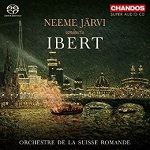 I
had forgotten how different Escales, the three ports of call
which Ibert depicts musically, are from his best-known work Divertissement.
I should have remembered that Sony/RCA thought it appropriate to pair
Escales with Debussy’s Printemps, La Mer and
Prélude à l’après-midi d’un Faune which programme survived until
recently on CD and is still available to download. (Living Stereo 88697689542
Boston SO/Charles Munch). Though the music is far from imitative, the
spirits of Debussy, Ravel and Chabrier are far from absent. The other
works in the first part of the programme, too, are more atmospheric
rather than one would expect from Divertissement.
I
had forgotten how different Escales, the three ports of call
which Ibert depicts musically, are from his best-known work Divertissement.
I should have remembered that Sony/RCA thought it appropriate to pair
Escales with Debussy’s Printemps, La Mer and
Prélude à l’après-midi d’un Faune which programme survived until
recently on CD and is still available to download. (Living Stereo 88697689542
Boston SO/Charles Munch). Though the music is far from imitative, the
spirits of Debussy, Ravel and Chabrier are far from absent. The other
works in the first part of the programme, too, are more atmospheric
rather than one would expect from Divertissement.
I came across Divertissement long ago on a Decca stereo LP of
miscellaneous French music (SXL2252, Martinon again, with the Paris
Conservatoire Orchestra): it had been salvaged from a fire and the cover
was slightly buckled from the water, so it was on offer for, I believe,
five shillings (£0.25). It was five shillings well spent, with a rip-roaring
account of the Ibert, especially of the finale, together with Bizet’s
Jeux d’Enfants and Saint-Saëns’ Danse macabre and le
Rouet d’Omphale. I played it so often that when it was reissued
a few years later on Ace of Diamonds SDD144 I had to replace it. It
remains available as a download (4783188, the contents of the
LP plus Borodin Symphony No.2) or in a 50-CD box set ( 4789262:
The Decca Sound).
As with Milhaud’s le Bœuf sur le Toît an ideal performance needs
to combine Gallic panache with equally Gallic vulgarity and the PCO
managed that to perfection, Parisian police whistles and all. I’m sure
it’s only nostalgia that makes me think they achieved that effect a
tad better than the OSR on the new Chandos; they and Neeme Järvi throw
their all at it and the 24-bit download is as close to demonstration
quality as the Decca was in its day. The new performances are very
slightly slower in all movements except one but that certainly doesn’t
mean that they are lacking in energy.
There are only two other recordings of Paris: two are download
only and the third is in a 10-CD box set. It’s certainly much better
than that comparative neglect implies and I enjoyed hearing it in this
performance. Bacchanale, also a comparatively neglected work,
rounds off an entertaining album in fine form. The 24-bit recording
is excellent, which also augurs well for the (less expensive) SACD,
due for release on 1 April 2016. The download is available now.
Introit: The Music of Gerald FINZI (1901-1956)
Lo! the full, final sacrifice – Amen (arr. Paul MEALOR) [2:40]
Dies Natalis – V. The Salutation (arr. Mike SHEPPARD)
[4:17]
Who is Silvia (arr Mike SHEPPARD) [1:43]
Love’s Labour’s Lost – Three Soliloquies
Clear and gentle stream (arr. Harvey BROUGH) [4:31]
Rollicum-Rorum (arr. Mike SHEPPARD) [1:43]
Introit [8:34]
Come away, come away, Death (arr. Paul MEALOR) [3:43]
Prelude, Op.25 [4:30]
Romance, Op.11 [7:35]
To Lizbie Brown (arr Mike SHEPPARD) [4:07]
Dies Natalis — Intrada [5:26]
Fear no more the heat o’ the sun (arr. Patrick HAWES) [5:36]
A Severn Rhapsody [6:36]
Eclogue [11:05]
Five Bagatelles (arr. Ashmore DICKSON): Carol [2:05]; Forlana
[3:00]
Amy Dickson (soprano and alto saxophone), Nicolas Fleury (horn), Thomas
Gould (violin), Tom Poster (piano)
Aurora Orchestra/Nicholas Collon
rec. Fairfield Halls, Croydon, 14 July and 20-21 August 2015. DDD.
DECCA 4789357 [81:39] – subscribers
stream from Qobuz with pdf booklet
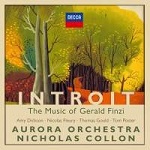 I’m
sorry to have to report that this tribute to Gerald Finzi on the 60th
anniversary of his death is largely a disappointment in that all the
vocal items are here ‘reimagined’ for solo instrument and orchestra.
Even worse, the beautiful Dies Natalis is presented only in the
form of two excerpts, separated from each other. Worse still, all the
download sources that I have checked out are over-priced, with mp3 costing
little less than the CD and lossless more than the disc. Only if you
must have 24-bit from
Qobuz is the outlay worthwhile.
I’m
sorry to have to report that this tribute to Gerald Finzi on the 60th
anniversary of his death is largely a disappointment in that all the
vocal items are here ‘reimagined’ for solo instrument and orchestra.
Even worse, the beautiful Dies Natalis is presented only in the
form of two excerpts, separated from each other. Worse still, all the
download sources that I have checked out are over-priced, with mp3 costing
little less than the CD and lossless more than the disc. Only if you
must have 24-bit from
Qobuz is the outlay worthwhile.
The ethereal beauty which permeates all Finzi’s music shines through
especially in the title work, Introit, and the wonderful Eclogue,
but these are available in other collections, notably on Lyrita SRCD.239:
Recording of the Month –
review – review
– in the company of other orchestral Finzi. That recording of Introit
is also available on an inexpensive Lyrita 4-CD set SRCD.2346
–
review – review
– DL
News: Bargain of the Month – with other British String
Concertos. The Lyrita recording of Eclogue is also on another
4-CD set, British Piano Concertos (SRCD.2345 –
review – DL
News). Eclogue, Romance and Prelude also feature
on a desirable Nimbus recording of Finzi’s orchestral music (NI5665
– review;
Eclogue also on NI5430/3 – review).
For the complete Dies Natalis my favourite remains the recording
by Wilfred Brown, the ECO and Christopher Finzi, now available only
in a budget-price 5-CD set (Warner 0954332, around £17). There
are very fine single-disc alternatives from Mark Padmore (Harmonia Mundi,
with Britten), John Mark Ainsley (Hyperion Helios, with Finzi’s Immortality
Ode) and Susan Gritton (Chandos, with Britten and Delius) to name
but three.
To put a more positive aspect on things, I was pleased to hear the four
young soloists. If I single out Tom Poster’s performance of Eclogue,
his first appearance on record, I believe, that’s largely because it’s
such a favourite work of mine. The performance here gives the music
even more space to breathe than on Nimbus and Lyrita.
Olivier MESSIAEN (1908-1992)
L’Ascension (The Ascension) (version for organ, 1933-34) [25:04]
Diptyque (Diptych) (1928-1930?) [10:51]
Offrande au Saint-Sacrement (Offering to the Holy Sacrament)
(1930s) [6:04]
Prélude (1928-1930?) [8:14]
Le Banquet céleste (The Celestial Banquet) (1928) [7:14]
Apparition de l’Église éternelle (Apparition of the Eternal Church]
(1932) [9:06]
Tom Winpenny (organ)
rec. St Giles’ Cathedral, Edinburgh, Scotland, on 17th and 18th February,
2015
Booklet includes organ specification
NAXOS 8.573471 [66:33] – from classicsonlinehd.com
(stream for subscribers or purchase download).
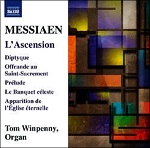 Dan
Morgan praised Tom Winpenny’s earlier Naxos recording of Messiaen’s
la Nativité for demonstrating ‘more head than heart, a fine performance
very well recorded’ – review.
Roy Westbrook also liked that release, made on Winpenny’s home territory,
at the organ of St Alban’s Abbey –
review – as did I – DL
News 2014/15. That earlier download could be obtained in 24-bit
sound but the new recording comes in plain 16-bit CD quality and was
recorded at St Giles’ Cathedral in Edinburgh; otherwise it’s equally
recommendable.
Dan
Morgan praised Tom Winpenny’s earlier Naxos recording of Messiaen’s
la Nativité for demonstrating ‘more head than heart, a fine performance
very well recorded’ – review.
Roy Westbrook also liked that release, made on Winpenny’s home territory,
at the organ of St Alban’s Abbey –
review – as did I – DL
News 2014/15. That earlier download could be obtained in 24-bit
sound but the new recording comes in plain 16-bit CD quality and was
recorded at St Giles’ Cathedral in Edinburgh; otherwise it’s equally
recommendable.
As before, this is a fine performance which emphasises the spirituality
of Messiaen’s theology. It won’t replace Gillian Weir (Decca Eloquence,
2 CDs), Jennifer Bate (budget-price Regis) or Timothy Byram-Wingfield
(Delphian, 2 CDs – review)
but I shall be listening to it along with them. The other serious challenger
in these early works which contributed so much to the making of Messiaen’s
reputation comes from Hans-Ola Ericsson who performs L’Ascension,
Le Banquet céleste, Apparition de l’Eglise éternelle and
Diptyque on the organ of Luleå Cathedral: BIS BIS-CD-409
– rec. 1988 [64:28] – from eclassical.com
(mp3 and lossless with pdf booklet, including organ spec.) As the programme
is almost identical, choice can safely be left to which organ you prefer
– try to sample both – and whether you prefer Ericsson’s slightly more
measured approach in all four of the works common to both. My own vote,
marginally, is for Winpenny but that didn’t stop me enjoying the BIS
recording.
Black marks to whoever it was that spelled the English word Sacrament
as Sacrement on the back cover of the Naxos booklet.
Rain WORTHINGTON (b.1950) Dream Vapors: Selected Works for
Orchestra
Shredding Glass (2001) [10:11]
Reversing Mirrors in the Quiet (2012) [6:08]
Tracing a Dream (2009) [8:15]
Fast through Dark Winds (2013) [6:33]
Within a Dance – A Tone Poem of Love (2012) [7:51]
Yet Still Night (2001) [6:04]
Of Time Remembered (2011) [7:56]
Czech Philharmonic Orchestra, Moravian Philharmonic Orchestra, Russian
Philharmonic Orchestra/Ovidiu Marinescu, Petr Vronsky, Robert Ian Winstin
rec. various locations, Czech Republic and Russia, 2006 to 2015. DDD
NAVONA NV6025 [52:58] – from eclassical.com
(mp3 and lossless with pdf information sheet). Subscribers stream from
classicsonlinehd.com
(lossless, with pdf sheet).
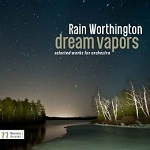 This
is not ‘easy’ music to relate to for someone like myself, who tends
to resist much contemporary classical music and jazz, but it’s worth
the effort. Some of it is quite spiky – as you would expect a piece
entitled Shredding Glass and inspired by the events of 9/11 to
be – but the spikiness is mixed with an ethereal quality that grew on
me.
This
is not ‘easy’ music to relate to for someone like myself, who tends
to resist much contemporary classical music and jazz, but it’s worth
the effort. Some of it is quite spiky – as you would expect a piece
entitled Shredding Glass and inspired by the events of 9/11 to
be – but the spikiness is mixed with an ethereal quality that grew on
me.
Shredding Glass and Yet Still Night have been available
before as single downloads and were reviewed
by Bob Briggs, whose comments are extensively quoted in the Navona
notes. His opening comment that ‘it’s always a real pleasure to discover
a composer whose work is new to you, whose work speaks to the senses
and is packed with real emotion’ sums up my response, too, as does Michael
Wilkinson’s review
of the new album. I just wish there were a few more optimistic touches
in the music.
The ‘booklet’ when downloaded turns out to be one side of information,
with a link to the Navona
website where the real thing may be located, together with scores
and other materials.
Hæc Dies : Music for Easter
Hymn at Lauds – Orlande de LASSUS (1530/2-1594) Aurora lucis
rutilat [3:19]
Respond at Matins – John TAVERNER (c.1490-1545) Dum transisset
Sabbatum [7:49]
Introit at Mass – Resurrexi (plainchant) [1:33]
Samuel SCHEIDT (1587-1654) Surrexit Christus hodie [1:14]
Ralph VAUGHAN WILLIAMS (1872-1958) Easter from Five
Mystical Songs [5:10]
Gradual at Mass – Hæc dies (plainchant) [2:57]
William BYRD (1539/40-1623) Hæc dies [2:07]
Matthew MARTIN (b.1976) Hæc dies * [4:32]
Sequence at Mass – Victimæ paschali laudes (plainchant) [2:01]
Giovanni BASSANO (1561-1617) Dic nobis Maria [2:48]
Offertory at Mass – Terra tremuit (plainchant) [1:18]
Giovanni Pierluigi da PALESTRINA (c.1525-1594) Terra tremuit
[2:03]
Orlande de LASSUS Surrexit pastor bonus [2:26]
Michael HALLER (1840-1915) Surrexit pastor bonus [2:21]
Communion at Mass - William BYRDPascha nostrum [2:12]
Jean L’HÉRITIER (c.1480–c.1551) Surrexit pastor bonus
[5:03]
Sergei RCHMANINOV (1873–1943) Dnes’ spaseniye (Today
salvation has come) [1:43]
Anthems - Samuel Sebastian WESLEY (1810–76) Blessed be the God
and Father [7:13]
Patrick HADLEY (1899–1973) My beloved spake [3:10]
Charles Villiers STANFORD (1852–1924) Ye choirs of new Jerusalem
[4:49]
Magnificat at Vespers - Orlande de LASSUSMagnificat
octavi toni super ‘Aurora lucis rutilat’ [6:09]
* world première recording
Matthew Jorysz (organ)
Choir of Clare College, Cambridge/Graham Ross
rec. 1 and 2 July 2015, All Hallows’ Church, Gospel Oak, London and
6 July 2015, Chapel of Tonbridge School, Kent, UK.
Texts and translations included
HARMONIA MUNDI HMU907655 [72:41] – from eclassical.com
(mp3, 16- and 24-bit lossless, with pdf booklet)
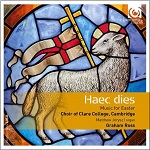 This
is the latest in a series of recordings from Clare and Harmonia Mundi
of music for different periods of the church year:
This
is the latest in a series of recordings from Clare and Harmonia Mundi
of music for different periods of the church year:
— HMU907579: Veni Emmanuel – Music for Advent - review
— HMU907615: Lux de cælo – Music for Christmas -
review
— HMU907616: Stabat Mater Dolorosa – Music for Passiontide
- review
— HMU907617: Requiem – Music for All Saints and All
Souls - review
— HMU907623: Ascendit Deus – Music for Ascensiontide
and Pentecost - review
As before the music comes from a considerable chronological spread,
in this case from plainsong via the early renaissance music of Taverner
and Lassus through to a composition by Matthew Martin receiving its
first recording. Actually, taking account of the chant, that’s even
more than the five centuries referred to in the notes and publicity
material. While it may be possible to prefer other recordings of individual
items, the standard overall is very high so it’s no hardship to have
to take the programme as a whole. As such I can’t think of a better
collection of music for Easter.
While I was waiting for the 24-bit to download I listened to the mp3
and that’s good enough to assure me that the quality of the 16-bit and
the CD will be very good. There’s no SACD, so the download is the only
way to obtain 24-bit. At $19.62 it comes at quite a premium over the
CD, selling at around £11.75 – less on special offer at the moment –
which means that even the 16-bit offers very little saving at $16.35.
Classicsonlinehd.com
were asking an even less competitive £16.49 for CD-quality 16-bit and
£16.99 for 24-bit when I checked and were not offering the booklet,
which brings me back to the point that I keep making about the highly
irrational pricing of downloads. I don’t know anyone who would willingly
pay more for less.
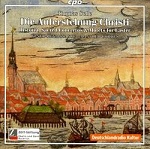
The CPO recording of Easter music by Thomas SELLE (1599-1663)
which I recommended in March
2010 as an mp3 download from classicsonline.com is no longer available
from them but can be obtained in mp3 and lossless from eclassical.com,
albeit without booklet. UK purchasers may find the classicsonlinehd.com
download slightly less expensive at £7.99 as against eclassical.com’s
$12.88 – again, there’s no booklet.
See also review
by Johan van Veen: ‘This disc bears witness to the quality of Selle’s
sacred music and gives some idea about the level of music-making in
Hamburg in the 17th century. Let’s hope more of this repertoire is going
to be explored.’
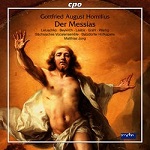 Gottfried
August HOMILIUS (1714-1785) composed a considerable amount of music
for Holy Week and Easter: several recordings of his music for this period
are available from Carus, including his St John Passion, St Mark Passion
and the Passion Cantata Ein Lämmlein geht und trägt die
Schuld. The most recent recording of his music is of another Passiontide
cantata, Der Messias (The Messiah: CPO7779472 -
details
and review).
Gottfried
August HOMILIUS (1714-1785) composed a considerable amount of music
for Holy Week and Easter: several recordings of his music for this period
are available from Carus, including his St John Passion, St Mark Passion
and the Passion Cantata Ein Lämmlein geht und trägt die
Schuld. The most recent recording of his music is of another Passiontide
cantata, Der Messias (The Messiah: CPO7779472 -
details
and review).
On two full-price CDs running for only 96:07 in total, this is rather
short value but eclassical.com's
per-second charging policy brings the price to a reasonable $17.30.
It's available in mp3 and lossless, with pdf booklet containing texts
and translations. Also available to stream
or download
for £15.99, with pdf booklet, from classicsonlinehd.com.
REISSUE OF THE MONTH
Russian Masters Volume 8
Nikolai RIMSKY-KORSAKOV (1844-1908)
Symphony No.2 in f sharp minor, Op.9, Antar [30:48]
Orchestre de la Suisse Romande/Ernest Ansermet – rec. 1954 ADD/stereo
Sergei RACHMANINOV (1873-1943) Piano Concerto No.2 in c minor,
Op.18 [32:45]
Julius Katchen (piano); London Symphony Orchestra/Sir Georg Solti –
rec. 1958 ADD/stereo
Alexander GLAZUNOV (1865-1936) arr. Robert Irving Birthday Offering
– ballet music [22:49]
Royal Philharmonic Orchestra/Robert Irving – rec. 1959 ADD/stereo
BEULAH 9PD11 [86:22] – from iTunes
(mp3). Subscribers stream from Qobuz
or download
in lossless sound.
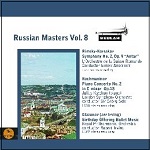 Rimsky’s
Antar is made from the same kind of material as Scheherazade:
lovely tunes but without the structure which keeps the Arabian Nights-inspired
work more or less in order. It’s certainly no symphony, though the composer
worked on it several times. Ansermet uses the 1897 revision for this
version, generally regarded as the first European stereo recording in
May 1954 – and very good stereo, indeed, for its time in this transfer.
With several Decca CD transfers on the market, past and current, you
might expect Beulah to have been at a disadvantage in working from the
LP but this is one of the very best that they have produced: it’s amazingly
good. Even played it at high volume the sound belies its age. Beulah
score, too, by offering it on a single release – and a very generously-timed
release, too. Otherwise, now that the coupling with Scheherazade
is a rather pricey download, you need to buy at least the 2-CD Eloquence
– good value with other Rimsky works in Ansermet classic recordings
– or the 33-CD or the 54-CD box.
Rimsky’s
Antar is made from the same kind of material as Scheherazade:
lovely tunes but without the structure which keeps the Arabian Nights-inspired
work more or less in order. It’s certainly no symphony, though the composer
worked on it several times. Ansermet uses the 1897 revision for this
version, generally regarded as the first European stereo recording in
May 1954 – and very good stereo, indeed, for its time in this transfer.
With several Decca CD transfers on the market, past and current, you
might expect Beulah to have been at a disadvantage in working from the
LP but this is one of the very best that they have produced: it’s amazingly
good. Even played it at high volume the sound belies its age. Beulah
score, too, by offering it on a single release – and a very generously-timed
release, too. Otherwise, now that the coupling with Scheherazade
is a rather pricey download, you need to buy at least the 2-CD Eloquence
– good value with other Rimsky works in Ansermet classic recordings
– or the 33-CD or the 54-CD box.
The Beulah release is worth having for this gorgeous performance alone.
I do recommend choosing the Qobuz
download in lossless sound to get the full benefit: it costs the
same as the iTunes mp3. I recommend it even if you already have the
very fine performance on Hyperion Helios from the Philharmonia and Yevgeny
Svetlanov (CDH55137, mp3 and lossless with pdf booklet, download
for £5.99 from hyperion-records.co.uk)
with the Russian Easter Festival Overture or the 2-for-1 Chandos
set of Symphonies 1-3, etc. (CHAN6613 – from theclassicalshop.net)
– both reviewed in March
2010.
The Rachmaninov recording, though later, doesn’t stand up quite so well
at top volume but it’s another fine transfer of another very fine, passionate
performance otherwise immured in that 54-CD box.
The Glazunov first appeared on HMV CLP1140, with Lecocq’s Mam’zelle
Angot. The music is compiled mainly from The Seasons, a very
fine recording of which with Robert Irving conducting the Concert Arts
Orchestra used to exist on EMI: unfortunately ousted by their later
Svetlanov recording. I don’t believe Birthday Offering is otherwise
available apart from a short 8-minute section on an inexpensive 100
Best Ballet collection. It’s well played, recorded and transferred
but no substitute for the complete Seasons ballet.
Sir John Barbirolli Symphonies Volume 3
Edmund RUBBRA (1901-1986) Symphony No.5 in B-flat, Op.63 (1948)
[28:58]
Jean SIBELIUS (1865-1967) Symphony No.5 in E-flat, Op.82 [33:26]
Hallé Orchestra/Sir John Barbirolli – rec.1953? ADD/mono; 1959?
ADD/stereo
BEULAH 3PDR17 [62:25] – due soon from iTunes.
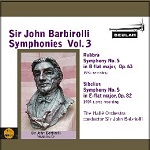 What
a difference a year made – between this recording of the Rubbra symphony
and that of Antar on 9PD11 (above). Actually I believe
that the Rubbra was made in 1950 rather than 1953 as stated: it was
released on four HMV 78s in 1952, coupled with Loth to Depart.
Though the sound was deemed ‘good on the whole’ back then, I found it
tiring to listen to and can’t regard it as much more than a valuable
historical document. Beulah transfers are often little short of miraculous
but the magic hasn’t worked on what was clearly a dry-sounding original,
presumably the LP release from 1953 (BLP1021). The EMI British Composers
transfer sounds a little more open but it involves a 5-CD set now available
only as a download (stream from Qobuz). My thanks to John Quinn for
reminding me that there's also a decently recorded single-CD release
with an indifferently recorded Sixth Symphony, from the Barbirolli Society
(SJB1081 - review).
With a splendid account available in modern sound from Richard Hickox
(Chandos CHAN9714, with Symphony No.8, or CHAN9944, complete
symphonies, 5 CDs) it's somewhat superfluous, especially as Hickox also
makes the music rather easier to absorb.
What
a difference a year made – between this recording of the Rubbra symphony
and that of Antar on 9PD11 (above). Actually I believe
that the Rubbra was made in 1950 rather than 1953 as stated: it was
released on four HMV 78s in 1952, coupled with Loth to Depart.
Though the sound was deemed ‘good on the whole’ back then, I found it
tiring to listen to and can’t regard it as much more than a valuable
historical document. Beulah transfers are often little short of miraculous
but the magic hasn’t worked on what was clearly a dry-sounding original,
presumably the LP release from 1953 (BLP1021). The EMI British Composers
transfer sounds a little more open but it involves a 5-CD set now available
only as a download (stream from Qobuz). My thanks to John Quinn for
reminding me that there's also a decently recorded single-CD release
with an indifferently recorded Sixth Symphony, from the Barbirolli Society
(SJB1081 - review).
With a splendid account available in modern sound from Richard Hickox
(Chandos CHAN9714, with Symphony No.8, or CHAN9944, complete
symphonies, 5 CDs) it's somewhat superfluous, especially as Hickox also
makes the music rather easier to absorb.
Barbirolli’s Sibelius is never superfluous: if we have forgotten what
a fine interpreter of it he was, that’s our loss. 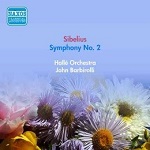 His
account of the very popular Fifth Symphony is spacious and though this
is a transfer of the Pye recording (CCL30144: 1957, I think, not 1958)
rather than the later HMV, the sound is much better than the Rubbra,
just a little rough in places. I just wish it could have been coupled
with more of Barbirolli’s Sibelius. Unfortunately his EMI recordings
are immured in Warner multi-CD sets and remain copyright for almost
another half century.
His
account of the very popular Fifth Symphony is spacious and though this
is a transfer of the Pye recording (CCL30144: 1957, I think, not 1958)
rather than the later HMV, the sound is much better than the Rubbra,
just a little rough in places. I just wish it could have been coupled
with more of Barbirolli’s Sibelius. Unfortunately his EMI recordings
are immured in Warner multi-CD sets and remain copyright for almost
another half century.
Barbirolli’s 1954 recording of Sibelius Symphony No.2 is available
in a decent mono transfer from Naxos Classical Archives – well
worth at least sampling by subscribers to Qobuz
and classicsonlinehd.com.
UK and EU readers should also be able to find that from Naxos Music
Library but my access to NML comes via Naxos US and it's not available
there for copyright reasons.



 All Nimbus reviews
All Nimbus reviews








